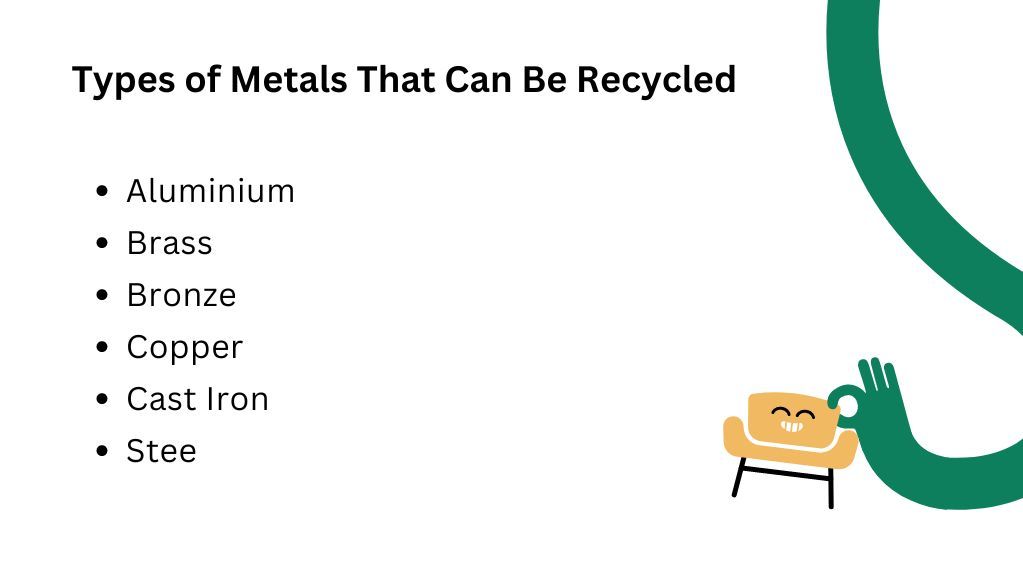
Amongst all waste product in Australia, metal has one of the highest recovery rates. According to the latest data from Australia’s National Waste Report, some 90% of the 5 million plus tonnes of metal produced in Australia each year is recovered.
So while the statistics are positive, there is still a long way to go. For most of us, there is less clarity around what they can do to mitigate metal waste. When it comes to disposing of unwanted or scrap metal from around the home, we all know that throwing it into the recycling bin isn’t the way to go.
Whether you’re looking to get rid of an old, rusted frying pan, or you’re looking to dispose of scrap metal from a recent project around the house, your recycling bin shouldn’t be its final destination.
So, if your recycling bin is a no-no for unwanted scrap metal, let’s look at what can be done to ensure that unwanted metal doesn’t contribute to Australia’s burgeoning landfill.
How metal recycling works
It’s important to understand that the way that metal is recycled will depend largely on the type, weight, and quantity of the materials. When it comes to recycling scrap and unwanted metal, the process will largely depend on the quantity and type of metal in question. All things being equal, the recycling process for scrap metal will involve:
Step 1: Collection/Drop Off
Step 2: Sorting & Processing
Step 3: Melting
Step 4: Recycle & Reuse

It’s important to remember that the type, shape, and weight of the metal will largely depend on how it is recycled. At one end of the scale, aluminium has a recycle rate of around 95% with an estimated 75% of all aluminium ever produced still in use today. While at the other end of the scale, Zinc recycling rates are only around 30%.
Types of metals that can be recycled
Metal comes in a range of different shapes, sizes, and weights. Whether you’re looking at unwanted renovation materials or simply looking to dispose of unwanted metal furniture or equipment that is clogging the shed, it’s important to know that almost all types of metal can be recycled to effectively cut down on waste.
Aluminium: Aluminium can be found just about everywhere. Around the home, some of the most common aluminium waste products that can be recycled include bicycle frames, pans, home appliances, general household waste products like tins and cans, furniture, and construction waste.
Brass: Common brass items that can be recycled include instruments, costume jewellery, light fixtures, locks, keys, hardware and tools, radiators, and much more.
Bronze: Bronze is far more common than most people realise. Bronze can be found in furniture, kitchenware, old keys, instruments, and all sorts of household fixtures.
Copper: Copper is widely used in a range of household items and can be one of the most common types of metal that that hangs around in the form of electrical wiring, plumbing materials, roofing materials, and even ornamental items after a renovation project.
Cast iron: Cast iron is commonplace in a range of old furniture items such as bathtubs, garden furniture, cookware, pipes, and even weights.
Steel: From appliances to paint tins, cookware, bicycles, electronics, automotive parts, and building materials, recycling steel is essential for conserving our natural resources and reducing landfill.
How you can recycle unwanted & scrap metal
Sell unwanted metal items
Recycling unwanted scrap metal doesn’t have to be a burden. For some items, particularly household items, equipment, and even unused construction materials, selling your unwanted metal items can be the best way to ensure that they don’t end up contributing to landfill.

Arrange for metal collection & recycling
For old metal that no longer serves a purpose and is unlikely to find a new home, it might be time to call in a company that provides scrap metal recycling services. At Ridly, we can collect and dispose of scrap metal responsibly and at a price that won’t break the bank. For those looking to offload old items and even construction waste that contains metal, calling in a specialist recycling company is your best option.
Why metal recycling matters for the environment
It’s obvious – recycling your unwanted metal is a far better alternative than adding to Australia’s burgeoning landfill each year. But while it may obvious that recycling unwanted metal is the way to go, it’s important to understand the many ways the recycling benefits the environment, preserves precious natural resources, and effectively cuts down on costs for. Businesses.
Reduce carbon emissions
Recycling old and unwanted scrap metal reduces the need to produce new, virgin metal which relies on natural resources like coal and iron ore during the production phase. As an example, Aluminium consumption accounts for 95% less energy use in producing aluminium with recycled cans than with new materials (climateaction.org).
Preserve natural resources
Recycling old and unwanted metal means lowering our reliance on new, virgin materials. Back in 2020 the EPA reported that recycling steel allows for a net saving of 1.4 tons of iron ore, 0.8 tons of coal and 0.3 tons of limestone per tonne of produced steel; an incredible amount considering the scale. Reducing our reliance on new materials is a significant step towards conserving natural resources and contributing to a more sustainable production process.
Offset carbon emissions
For businesses in Australia, we all need to do our part as we work towards net zero. Recycling metal (amongst other materials) is one way to combat carbon emissions and contribute to a more sustainable future. Recycling unwanted metals means constructing to your businesses carbon goals as well as encouraging your customers to make better environmental decisions.